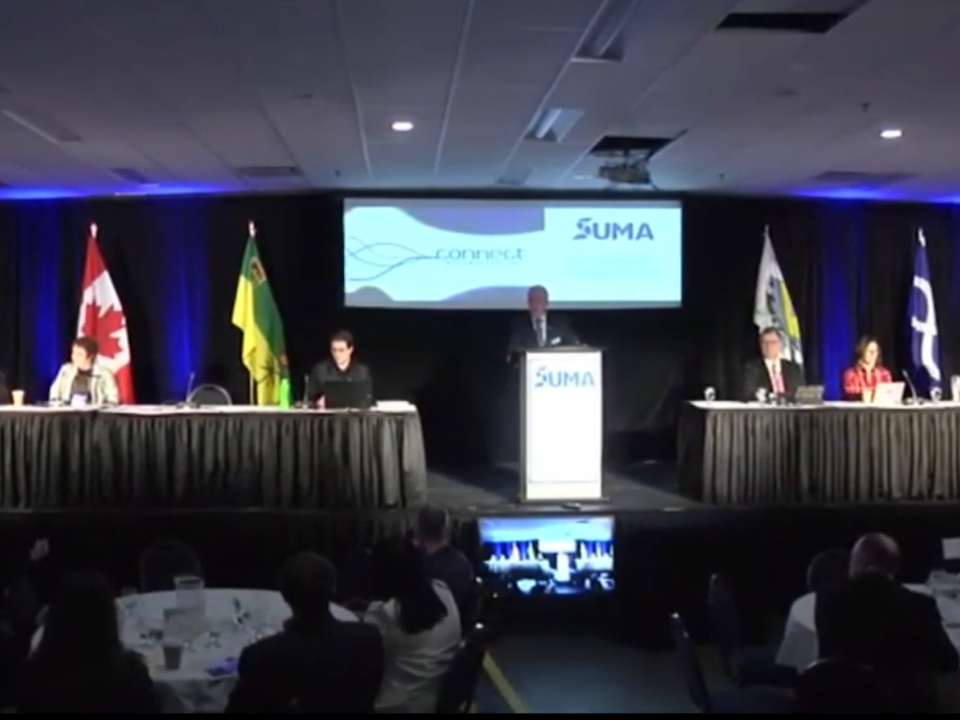REGINA ‑ The resolutions before the Saskatchewan Urban Municipalities Convention proved popular this year.
All 24 of the resolutions before the convention delegates passed Monday afternoon. Instead of delegates using voting cards in the hall, the resolution session was conducted electronically this year, with some attendees allowed to attend the session and vote virtually.
Most made it through the electronic voting process by overwhelming “yes” votes, but there were some more contentious votes.
One of the closer votes was on speed limits when passing emergency vehicles. By a close margin, delegates approved the resolution that SUMA advocate the province's Ministry of Highways and Infrastructure to further reduce the speed limit when passing emergency vehicles to 40 km/h.
Right now the speed limit is set at 60 km/h when passing emergency vehicles with their lights on.
While that resolution carried, there was sentiment on the floor to reduce the speed limit even further. An amendment was voting on that would have called for the speed limit to be reduced to 30 km/h when passing vehicles, but that was defeated.
On a related note, SUMA passed a resolution advocating that SGI have all emergency vehicles equipped with blue flashing lights when emergency vehicles are stopped on scene, and that all emergency vehicles display flashing lights while on scene. That carried easily.
Health care was also raised at the convention. One resolution called for SUMA to advocate for the immediate development of long-term recruitment and retention plans to adequately provide and maintain health care across the province.
The resolution noted that the Saskatchewan Health Authority “does not allocate sufficient resources towards recruiting and retaining RNs and LPNs.” The main motion passed 287 to 12.
Another resolution advocated for the provincial government to “break the cycle of problematic mental health, addiction and homelessness issues by co-ordinating provincial ministries, police services, community agencies and Indigenous organizations and governments in order to ensure effective, evidence-based responses that address all of these issues.”
That resolution also called for the province to increase drug, alcohol, addictions and homelessness funding for organizations and municipalities. That also carried.
Libraries also were a major issue. Delegates passed a resolution calling on the province to adequately fund the public library system to keep pace with inflation and to ensure funding is increased annually to improve and support library services in both large and small communities. The resolution also called for SUMA to participate fully in any government reviews, meetings or discussion.
The issue of cleanup of abandoned hydro-carbon sites seems to be a familiar one at SUMA conventions and it came up again this year.
Delegates passed a resolution calling for the province to “take immediate action to more frequently and fully enforce the Environmental Management and Protection Act and Regulations,” requiring owners of abandoned hydro-carbon sites to decommission and remediate contamination in a timely manner.
SUMA delegates called for the provincial government to create a separate fund, outside of Municipal Revenue Sharing, to assist in the disposal of demolition materials including asbestos from derelict buildings.
Delegates passed a resolution calling on the provincial Ministry of Corrections, Policing, and Public Safety to enforce enhanced policing agreements, develop policy requiring the RCMP to adhere to specifications in the contract regarding allotted amount of time policing occurs within municipal boundaries, and provide additional police officers for outlying areas.
SUMA delegates also supported a resolution to advocate the Government of Canada to maintain responsibility for body-worn cameras for the RCMP and absorb costs related to them; and to advocate the federal government and RCMP to “engage in meaningful engagement and consultation with municipalities when making decisions that will direct affect them.”



